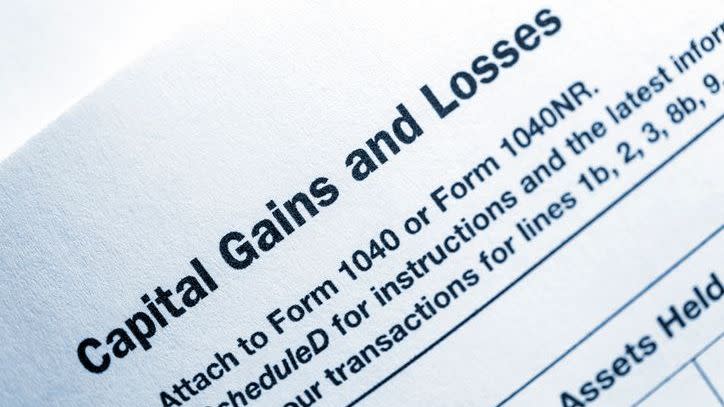
Selling your longtime home and downsizing in retirement is a common practice for people entering their golden years. While profits from a home sale are considered capital gains, the IRS typically allows you to exclude part of the profit – if not all of it – from your taxes.
But what if you sold your home and pocketed as much as $640,000? You could still end up owing a hefty capital gains tax bill on the sale depending on if you’re married or not. Then again, you still may be able to avoid taxation by using other investment losses to offset your gain or delay taxes with a like-kind exchange. But if you need additional help managing your capital gains tax bill, consider speaking with a financial advisor.
About Capital Gains Taxes
When an investment appreciates and sells for more than its original purchase price, the profit gets taxed. This applies to assets like stocks, bonds, collectibles and real estate, including your personal residence.
For assets that are owned for more than a year, the IRS applies long-term capital gains rates of 0%, 15% or 20%. The precise capital gains tax that will be applied depends on the taxpayer’s income, but capital gains taxes are generally lower than the ordinary income tax rates. Many U.S. states also tax capital gains, levying rates they use for ordinary income.
Gains on personal home sales are treated differently, however. You can exclude some or all of the gain from taxation if you lived in the home for at least two of the last five years (cumulatively). And when you’re getting ready to make a large financial decision, like selling your home to downsize, talk it over with a financial advisor who can help you understand how the move will impact your larger financial plan.
Capital Gains Tax Impact

If you net $640,000 from the sale of your longtime home, your capital gains tax bill will depend on a couple of factors:
-
Filing status. This affects how much of the gain you can exclude. If you’re married and filing jointly, you can exclude up to $500,000 in home sale profits. This would leave $140,000 of the $640,000 subject to taxes. If you’re filing as an individual, you can exclude up to $250,000. In this case, $390,000 would be subject to taxes.
-
Income. Capital gains tax rates for most people are 0%, 15% and 20% based on their income.
Assuming you pay 15% on capital gains, you’ll owe $21,000 ($140,000*0.15) in federal taxes after applying the exclusion if you’re married and filing jointly. If your filing status is single, you’ll owe $58,500 in capital gains tax ($390,000*0.15). But remember, a financial advisor can help you plan for capital gains taxes and find ways to potentially mitigate them.
Avoiding Capital Gains Tax
You have limited options for avoiding capital gains tax after applying the principal residence exclusion. However, there are some available techniques, including:
-
Accurately calculating your cost basis. The cost basis is the purchase price of your home plus eligible improvements. You subtract the cost basis from the amount you sell the home to get the taxable gain. Including the expense of adding on a room or other improvement in your cost basis could significantly reduce your taxable gain.
-
Offsetting investment gains with losses. You can reduce taxable capital gains by harvesting investment losses. For instance, if you sold a stock for $40,000 less than you paid for it, the loss would offset $40,000 of your home sale profit. In that case, you would reduce the taxable gain on your home sale from $21,000 to $15,000 (assuming you’re married and file jointly).
-
Using a like-kind exchange. Using a technique called a 1031 exchange, you may be able to use the entire proceeds from your home sale to purchase another residence without having to immediately pay taxes on the gain. While tax rules limit 1031 exchanges to investment properties, you may be able to do an exchange on your home if you move out and rent it to someone else for at least two years. This converts it into an investment property in the eyes of the IRS. At that point, you can do a like-kind exchange for another property. After renting this new property out for a year or so, you may then be able to move into it and use it as your personal residence.
And if you need advice regarding a 1031 exchange or the other strategies listed here, consider speaking with a financial advisor.
Capital Gains Tax Avoidance Limitations

These techniques can only be used in certain situations. For instance, special rules may apply if you inherited the home. Other limitations could also apply, including:
-
You may only be able to avoid taxes on a portion of your gains. Unless your gain is less than the allowable exclusion or you have sufficient offsetting losses, part of your gain may still be taxed.
-
A like-kind exchange only delays taxes. When you eventually sell the property you exchanged for, that sale will trigger taxes.
-
Not all properties qualify for exclusion. The capital gains exclusion for primary residences doesn’t apply to vacation homes or investment properties.
-
There are residency period conditions. Living in the home for less than two of the previous five years means you can’t use the exclusion. You may have to provide tax returns, utility bills and other documentation to show you lived there for the required time.
Bottom Line
Homeowner who meets IRS conditions can exclude up to $500,000 in profits from the sale of their primary home from taxes ($250,000 if they’re single). However, a gain that exceeds the IRS exclusion limits will be subject to long-term capital gains taxes if the home was owned for more than a year. In that scenario, you could use tax-loss harvesting to offset part of the gain and lower your tax bill or a like-kind exchange to defer the taxes until a later date.
Tips for Managing Capital Gains
-
Develop a strategy for protecting gains realized on your home sale from taxes by consulting a financial planner. SmartAsset’s free tool matches you with up to three financial advisors in your area, and you can interview your advisor matches at no cost to decide which one is right for you. If you’re ready to find an advisor who can help you achieve your financial goals, get started now.
-
Use SmartAsset’s Capital Gains Tax Calculator to estimate how much you could owe in tax on the sale of assets like stocks and real estate.
-
Keep an emergency fund on hand in case you run into unexpected expenses. An emergency fund should be liquid — in an account that isn’t at risk of significant fluctuation like the stock market. The tradeoff is that the value of liquid cash can be eroded by inflation. But a high-interest account allows you to earn compound interest. Compare savings accounts from these banks.
Photo credit: ©iStock.com/PeopleImages, ©iStock.com/skhoward, ©iStock.com/blackCAT
The post I’m Selling My House and Netting $640k to Downsize for Retirement. How Can I Avoid Capital Gains Taxes? appeared first on SmartReads by SmartAsset.
EMEA Tribune is not involved in this news article, it is taken from our partners and or from the News Agencies. Copyright and Credit go to the News Agencies, email news@emeatribune.com Follow our WhatsApp verified Channel




